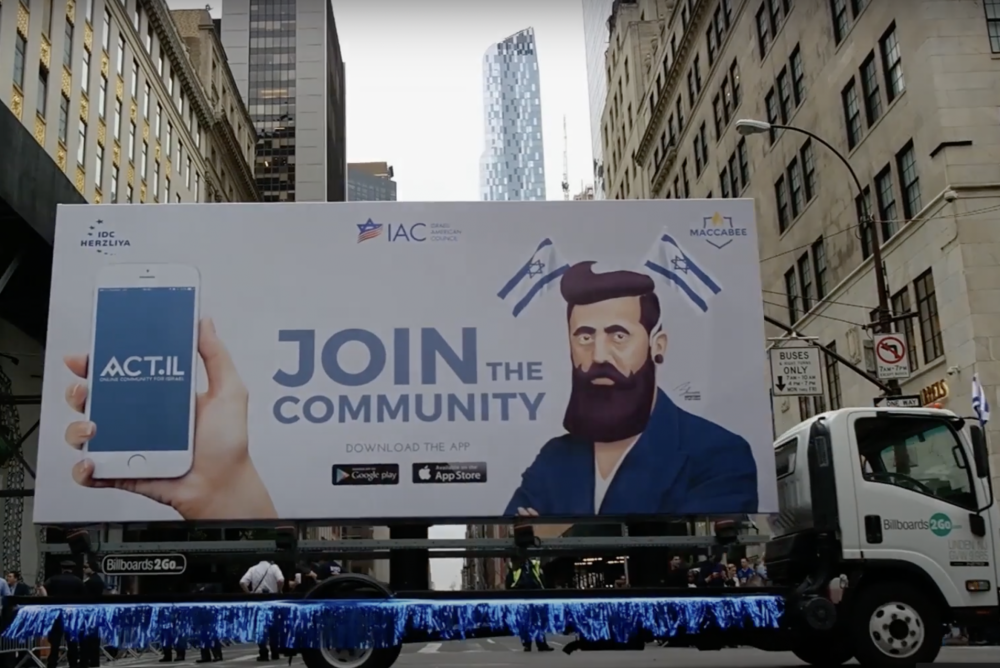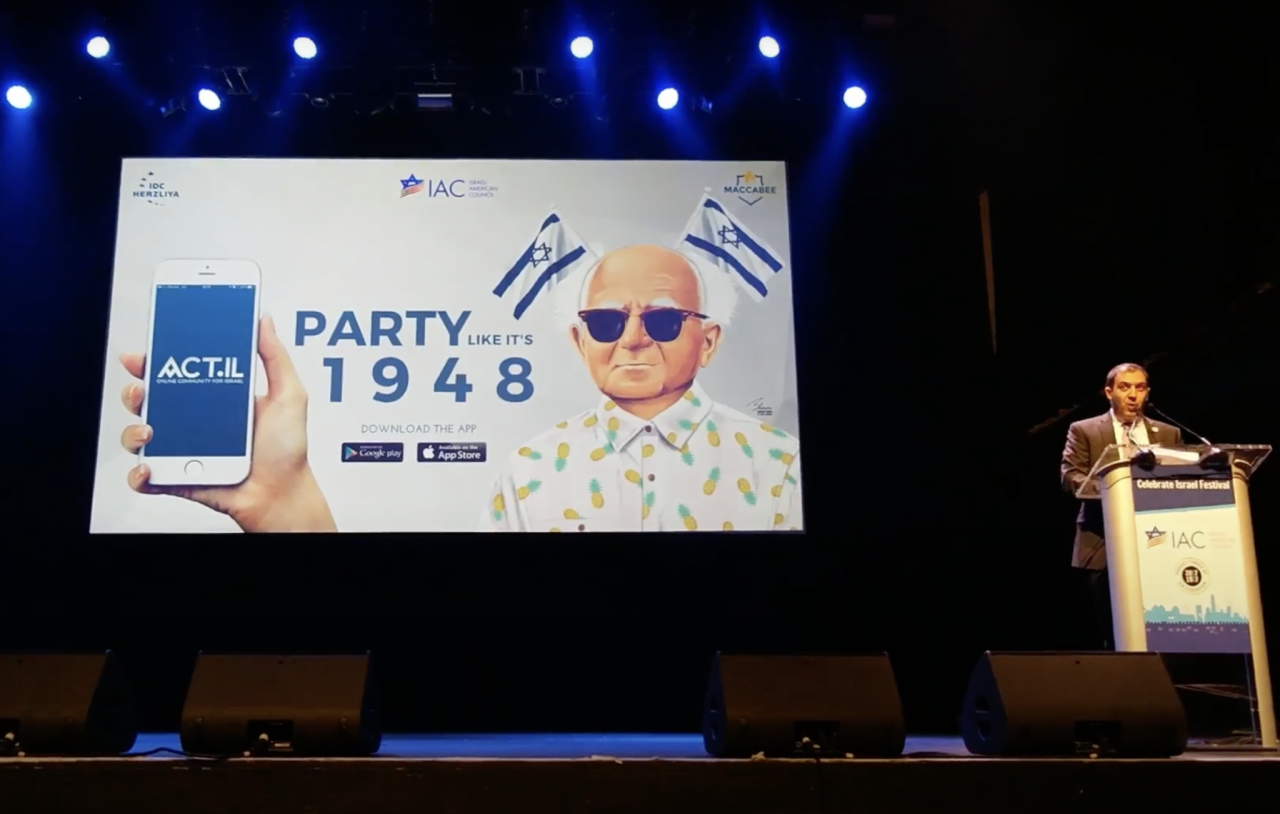A Brief Colonial History Of Ceylon(SriLanka)
Sri Lanka: One Island Two Nations
A Brief Colonial History Of Ceylon(SriLanka)
Sri Lanka: One Island Two Nations
(Full Story)
Search This Blog
Back to 500BC.
==========================
Thiranjala Weerasinghe sj.- One Island Two Nations
?????????????????????????????????????????????????Tuesday, April 26, 2022
Mission failed: How Israel’s anti-BDS app went belly-up
Canadian academic and activist Michael Bueckert spent years tracking Israel’s online ‘troll army.’ From the sinister to the cringeworthy, he tells all to +972.
A float marking the launch of Act.IL, a pro-Israel app, New York, June 4, 2017. (Screenshot: Act.IL YouTube)
In June 2017, at an event connected to New York’s annual Celebrate Israel parade, then-Minister of Strategic Affairs Gilad Erdan announced the launch of a new digital campaign, 4IL (“For Israel”), a one-stop digital shop designed to provide tools for activists to promote Israel and delegitimize the Palestinian-led Boycott, Divestment, and Sanctions (BDS) movement.
The centerpiece of the initiative was an app called Act.IL, which would assign users “missions” to push back on articles and social media posts deemed critical of Israel and/or supportive of the boycott movement; Erdan called the new project an “Iron Dome of truth” and “a true game changer in defending Israel online and changing the narrative.” At the New York parade, a float promoting the app showed a cellphone with Act.IL’s logo next to a rendition of Theodor Herzl, the father of modern Zionism, as a hipster, complete — for some reason — with a pair of Israeli flags protruding from his head.
The app took a scattergun approach to devising “missions” over the years. While a large proportion of its tasks revolved around targeting boycotts, justifying Israeli oppression, and going after human rights groups and activists, Act.IL also assigned its users a wide range of other tasks. These ranged from trying to marshal support for Israeli technology and culture, to suggesting that people criticize Israeli conscientious objectors and praise joint Israeli-German military exercises. Some missions also strayed into inane territory, such as calling on users to discuss an apparent emerging Israeli fashion trend of sporting trucker hats with animal designs on them.
The official story behind Act.IL is that it was developed by students at one of Israel’s private colleges, building on hasbara (Israeli government PR) work they had been conducting during the 2014 assault on Gaza. Yet it also had the involvement of former Israeli intelligence officials, the Israeli government, and was bankrolled at least in part by the late casino billionaire Sheldon Adelson. The app’s operators, like the Israeli government, still repeatedly insisted on its grassroots bona fides, characterizing it as little more than a civil society effort at centralizing opposition to “anti-Israel propaganda.”
But if you ask Michael Bueckert, a Canadian academic, activist, and vice president of Canadians for Justice and Peace in the Middle East (CJPME), who spent almost five years monitoring Act.IL via the Twitter account “Behind Israel’s Troll Army,” the prevarication around the app’s origins and operators was part of a broader “no logo” strategy pursued by the Israeli government. Bueckert says that this allowed the authorities to “choreograph social media activity without having the source identified… The idea was as much as possible to make it look like spontaneous grassroots responses to things online.”
Michael Bueckert. (Courtesy)
Five years later, that strategy appears to have failed, at least in this format. Last month, the Act.IL app was closed, less than a year after the Strategic Affairs Ministry, which for years led the government’s charge against the boycott movement — often surreptitiously and through paid-for propaganda in media outlets — was folded into the Foreign Ministry. In an email to users, Act.IL claimed the app’s shuttering was part of “[k]eeping up with the evolving trends of social media,” and that it had been “a wonderful tool in its day.”
Shortly after the app’s closure was announced, Bueckert — whose academic research compares the 1980s Canadian movement against apartheid South Africa to today’s Palestinian BDS movement, and specifically the state propaganda deployed against them — spoke to +972 about the years he spent tracking and publicizing the app’s missions; the wider meaning of the app’s launch and failure; and the similarities he saw between South Africa’s response to anti-apartheid organizing and Israel’s efforts to muzzle BDS activists.
The following conversation has been edited for length and clarity.
You started the Twitter account ‘Behind Israel’s Troll Army’ in April 2018. What was going on at the time that acted as the catalyst for you to start that account? What exactly were you monitoring?
I downloaded [Act.IL] in 2017 when it was first launched. My graduate studies work was looking at questions of propaganda, and this app seemed very much aligned with that. I played around with it a bit, looking at some of the “missions,” and then kept checking up on it to see what it was up to.
Every once in a while I would tweet on my own account missions that I thought were pretty egregious. But the one thing that really encouraged me to spend more time monitoring the app was when Ahed Tamimi [a young Palestinian activist from the West Bank village of Nabi Saleh] was arrested [in December 2017] for slapping a soldier, and there were talking points from the app saying, “Age doesn’t matter, it doesn’t matter she was a teenager, these soldiers were there to protect her and she was disrespecting them.” It was giving justifications for the abuse of a girl under occupation.
After I posted that, it was clear that people were interested in what the app was doing, so I decided to consolidate it into a single account. I thought it was important that when the missions were trying to intervene in local campaigns or targeting specific people, that people would know this app is involved — and that the backlash they might be seeing isn’t organic or genuine, but may actually be choreographed by this app endorsed by the Israeli government.
You say the app was launched in 2017 — what was going on in the wider world of hasbara and Israel-Palestine that led to this effort to try and galvanize the social media hasbara operation?
This was a few years after the 2014 war on Gaza. Every time there’s a major [Israeli] assault, there’s a bit of a turning point in that a new cohort of people become engaged and learn more about these issues. Each time there seems to be more media attention given to Palestinian perspectives. So 2014 was really significant in changing and radicalizing people for justice.
Israel was obviously paying close attention to this, and at the time the Ministry of Strategic Affairs was really getting underway. Gilad Erdan was putting a lot more resources into different propaganda tools, with lots of threats about covert ops and spying on BDS activists. Around the same era you also had efforts within Israel to pass laws to punish BDS activists. So it was part of this wave of repression against BDS activity.
Over the years that you were monitoring Act.IL, did you notice certain trends over time, or whether certain ‘missions’ got more of a response than others?
It’s hard to tell whether any of the missions themselves were actually successful. [The app] undertook a lot of different campaigns over the years, and a lot of them had to do with responding to cultural boycotts and welcoming celebrities who announced they’re coming to Israel. A lot of what they were doing wasn’t that interesting or relevant, like making sure people were posting nice things about Israel.
The things I found more troubling were cases where they were targeting international attention on a local [pro-Palestinian] campaign. Some of those got really sinister — targeting students on campuses, for example, in one case supporting a blacklist website purporting to expose how students voted in a supposedly secret ballot.
Was that Canary Mission?
It wasn’t Canary Mission. It looked like it was a local, on-campus [website] at George Washington University. These students had a secret ballot vote on divestment, and this website popped up that purported to expose how people had voted, with their photos, and the app was promoting that website. So it was things like that, as well as the more typical, “email the university administration and ask them to fire this teaching assistant.”
When a big escalation would break out in Israel-Palestine, the app would start to do a scattershot across media sources on Facebook and Twitter and direct people to “like” certain comments so they would become the featured comment. They were trying to shift what the most frequently-viewed comments were to try to shape the narrative.
When the app was launched, the Israeli government was at the forefront of pushing it. Their logo was prominently featured on the app’s website, and they had all this promoted content in Israeli news sources where the government was bragging about its role as a partner in this initiative. Over time, they moved away from that — changing on [Act.IL’s] website where the Israeli government logo was, and eventually removing it completely and denying the government’s role in the app.
Do you have a sense of whether that shift came because the Israeli government realized the app wasn’t that successful, and wasn’t worth attaching their name to it, or because of some kind of backlash?
I think one of the app’s key purposes was to have this “no logo” strategy, of being able to choreograph social media activity without having the source identified — without revealing that the app was behind it, let alone the Israeli government. The idea was as much as possible to make it look like spontaneous grassroots responses to things online. Having the Israeli government associated with this app undermined what it was trying to do.
Over time, Israeli government’s role in this, and the “no logo” strategy in general, backfired a bit, because I started getting messages from people wondering whether the app was involved in a certain campaign — and I think that by hiding the role of the app and the government, it created a very reasonable suspicion among people that potentially anything happening online [around Israel-Palestine] could be directed by Israel, or by its partners.
Were there many missions directed at right-wing groups or entities? Or was it just about the left?
In the last couple of years there was more of a focus on white supremacy as well. Some of the missions would be reporting antisemitic content. That was definitely a minority of missions, and by far the most missions were just about normal Palestinian activism.
That’s also what happened with websites like StopAntisemitism and Canary Mission. It was a recent development that seemed like a strategy to try and give the appearance of balance.
Yup.
Were there any missions from the app that you found particularly outlandish or cringeworthy over the years?
Oh my gosh, there were so many. They went after so many people — Peter Beinart after he wrote his article on anti-Zionism; lots of missions against Jewish Voice for Peace and IfNotNow; and in one case, The Guardian published an article about Israel excluding Palestinians under occupation from the COVID-19 vaccination program, and the app got J Street to delete their tweet [about the article], which I thought was kind of pathetic at the time.
[The missions] were all so cringey. Giving five-star reviews to an Israeli restaurant opening up in Toronto. A ton that justified the use of violence against civilians or children. They went after the HBO show “Our Boys,” tried to shut down comparisons with Black Lives Matter, defended the deportation of [Human Rights Watch’s Israel/Palestine director] Omar Shakir.
Every year around Christmas, articles come out about Bethlehem and how it’s under occupation. There would be a ton of missions trying to shut that down and saying how great Christians in Israel are doing — trying to make sure that Christmas wasn’t a time for Palestinian sentiment.
They also had so many missions when California was going through the process of adopting an ethnic studies curriculum. The proposed curriculum had all these Arab and Palestinian perspectives in it, and there were countless missions targeting that. They ended up declaring success; the app wasn’t the only actor in that, but they staged dozens of missions trying to shut it down.
Why do you think the app has closed down now?
I don’t know if it was ever that successful. It certainly got buy-in from groups in the U.S. and even Canada to an extent, but I never got the sense that a lot of people were participating, even though they were spending a lot of money on the app — at one point its budget was a million dollars a year.
It also wasn’t that long ago that the Ministry of Strategic Affairs, which was largely behind this, was also shut down and a lot of its activities were moved elsewhere. So there might be a retraction of some of these hasbara strategies. I’d like to think that the work I was doing was helping to take away the power of some of these campaigns by showing that they weren’t actually organic and could be traced in some way to the Israeli government.
A launch event for the anti-BDS app Act.IL, New York, June 4, 2017. (Screenshot: Act.IL YouTube)
Also, in the last couple of years they’ve been moving missions outside of the app and into WhatsApp or Telegram — I get the sense that there aren’t a lot of people in those groups, but that those missions get a faster turnaround.
What is your sense of the state of play for hasbara in 2022 versus back in 2017 when the app launched? What have been its successes and failures over the past few years?
The whole philosophy behind the app was that it was an “Iron Dome of truth,” that the problem was misinformation and lies, and what they needed to do was get the truth out there. But that was never the case — the problem is that the truth was Israel’s actions, and those haven’t changed, and people are becoming more aware of what Israel’s actually doing.
In the last year, things have really shifted again because of all the attention from the escalation in May 2021. There were huge protests around Canada, bigger than I’ve ever seen, and we’ve also seen Canadian political parties being more vocal in support of an arms embargo [on Israel]. We’ve seen the reports from Amnesty International and Human Rights Watch [on Israeli apartheid]. A lot has shifted in the past year that disadvantaged the work this app was trying to do, and the more this continues to happen — the more that people are exposed to Israeli actions on the ground and to Palestinian perspectives — the less effective any of this [hasbara] is going to be.
I think the app was a doomed project from the start — just a good way, maybe, for the Ministry of Strategic Affairs to look like it was doing something and to build connections to other pro-Israel groups around the world.
Part of your doctoral research looked at the backlash to Canadian anti-apartheid activism in the 1980s alongside that of the BDS movement today. What kind of comparisons did you draw between apartheid-era South African propaganda and that from the Israeli government?
The rhetoric is very similar. South Africa and its supporters would always talk about being singled out for criticism, about being held to double standards, or that the anti-apartheid movement was not just trying to change policies but was a threat to South African society itself. But none of that was very convincing, whereas today those kinds of arguments — which are essentially about a lack of fairness in how [Israel] is being treated — is being defined as antisemitic, and that has a lot of power that South Africa’s advocates never had.
At a broader level, both governments poured a lot of money and resources into international propaganda campaigns. For decades the South African government was creating radio stations and newspapers, and in the 1970s it conducted this covert propaganda war where it was creating front organizations — work that continued throughout the ‘80s, including in Canada.
One interesting case that really reminds me a lot of [Act.IL] is, in the late ’80s, the South African embassy in Canada ran a front network of fake pro-South Africa groups. They would find volunteers in cities across the country, give them a name like “Winnipeg Friends of South Africa,” then put a fax machine in their basement and send them daily “missions” — writing a letter to the editor on behalf of their group, for example, or responding to other things. They’d give these volunteers honoraria.
On the one hand, there’s a similarity in the covert role of the state in directing people to put out positive messages without being linked to the country itself. What’s different is that South Africa had to create its own front organizations. Israel doesn’t seem to have to do that. Maybe it is creating front organizations and that just hasn’t been documented, but for the most part it seems to be involved in the covert funneling of money to actual grassroots organizations around the world.
They have a genuine constituency who are willing to be recruited into these kinds of initiatives in a way that South Africa didn’t. So Israel is blurring the lines between state and civil society — which South Africa also did, but [the latter] had to manufacture that civil society.


%20(2)%20(1)%20(1).jpg)

